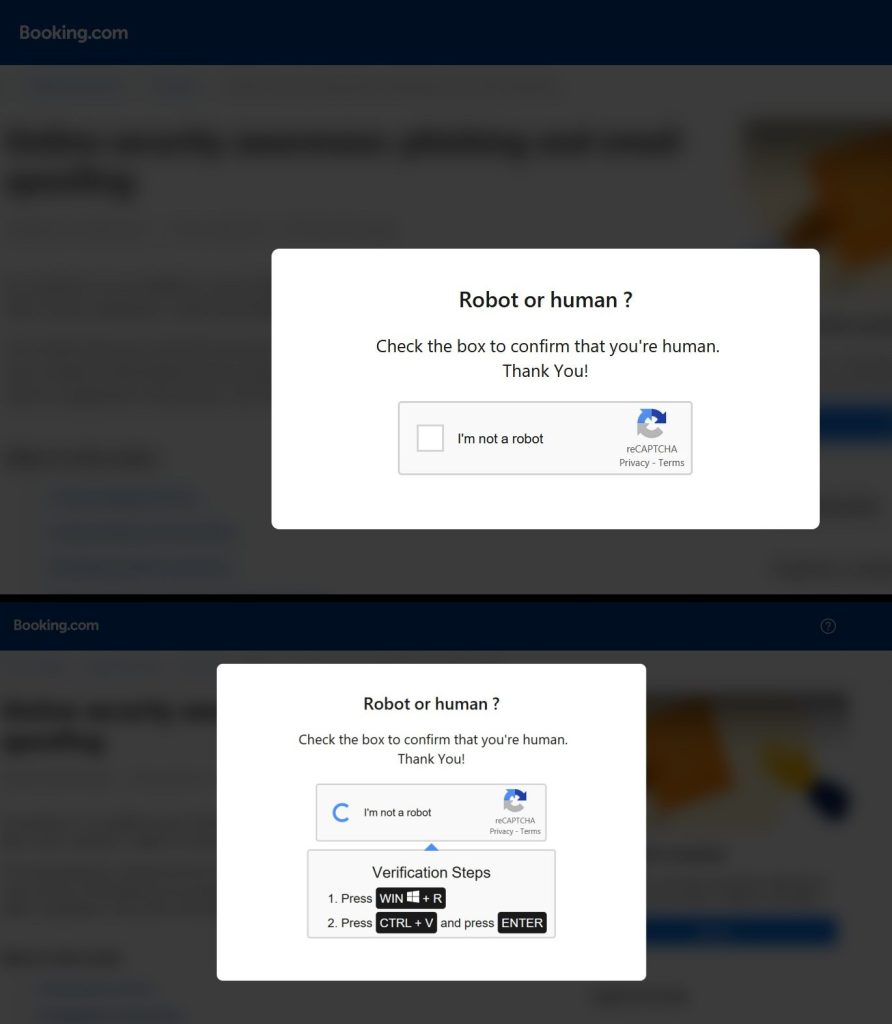Faux Reserving.com emails trick lodge employees into operating AsyncRAT malware through faux CAPTCHA, concentrating on programs with distant entry trojan.
A brand new phishing marketing campaign is concentrating on lodge employees with faux Reserving.com emails, tricking victims into executing malicious instructions on their very own programs. The rip-off seems well-planned, combining social engineering with the top intention to contaminate and compromise lodge networks with AsyncRAT.
It Begins with a Convincing Electronic mail
The assault begins with a message that seems to return from Reserving.com. The e-mail claims a visitor has left behind necessary private belongings and urges the lodge supervisor to click on a button labelled “View visitor info.”
The e-mail is well mannered, pressing and designed to look authentic, typical of social engineering makes an attempt designed to trick individuals into clicking with out pondering.
A Faux CAPTCHA Hides the Actual Risk
Clicking the hyperlink takes the consumer to a lookalike Reserving.com website hosted at: reserving.partlet-id739847.com. The web page initially presents a CAPTCHA asking the customer to substantiate they’re not a robotic.
After checking the field, customers are introduced with one thing much more suspicious — a set of directions that inform them to press WIN + R (to open the Home windows Run dialogue), adopted by CTRL + V and Enter. This trick makes use of the clipboard to ship and execute a hidden command.
Behind the Scenes: AsyncRAT
Safety evaluation of the malware delivered on this rip-off reveals it’s AsyncRAT, a distant entry trojan. This malware has been lively because the second half of 2019 and has gained reputation amongst cybercriminals due to its open-source and extremely customizable options.
AsyncRAT is able to:
- Keystroke logging
- Distant desktop viewing
- File entry and information theft
- Putting in further payloads
- Persistent management over contaminated programs
AsyncRAT has been actively utilized in cyberattacks over the previous few years. In Could 2021, Microsoft noticed AsyncRAT concentrating on aerospace and journey organizations. By November 2021, safety researchers discovered it being delivered alongside different malware households to contaminate programs and steal cryptocurrencies.
In June 2023, cybersecurity agency eSentire reported a brand new variant known as DcRAT, which was embedded in OnlyFans-related content material a rebranded model of AsyncRAT. Then in January 2024, the malware was noticed concentrating on crucial infrastructure in america, this time utilizing malicious GIF and SVG information to ship the payload.
The malware runs through MSBuild.exe, a authentic Home windows utility, serving to it evade some antivirus instruments. It installs itself within the %AppData% listing and communicates with a command-and-control server at 185.39.17.70 over port 8848.
Why this Phishing Rip-off is Tough
In contrast to primary phishing campaigns that intention to steal passwords, this one goes a lot additional. It guides the consumer into executing malware manually, a intelligent approach to bypass safety restrictions and keep away from triggering downloads.
If profitable, attackers might achieve full distant entry to lodge programs, placing buyer information, reservation data, and cost data in danger.
Ideas for Inns and Workers
- By no means click on hyperlinks in unsolicited emails, even when they appear official.
- Don’t run instructions based mostly on directions from emails or web sites, particularly something involving the Home windows Run dialogue.
- Test the area, actual Reserving.com hyperlinks don’t include additional subdomains like
partlet-id739847.
- Report suspicious messages on to Reserving.com through their official accomplice help channels.
This marketing campaign is simply one other instance of how phishing has develop into a risk by combining reasonable branding with malware execution ways. Resort managers and employees ought to keep alert and deal with any sudden e-mail involving visitor information with warning.


